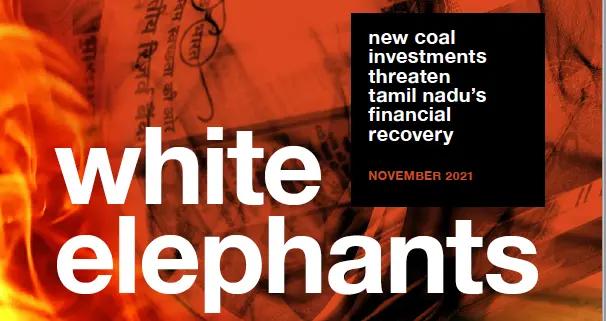
Udangudi Stage 1&2 projects will worsen Tamil Nadu finances, raise power tariffs
Chennai, December 15, 2021: Tamil Nadu could see a further deterioration of its fiscal situation if it proceeds with the Udangudi Stage I and II (formerly Uppur) projects, warns a new report from analytics firm Climate Risk Horizons. Combined, the Udangudi Stage I & II projects will result in an increase in state debt of at least 20,000 cr. as well as raise power purchase costs, implying either a tariff hike for consumers or an increase in state subsidies. Opting for a combination of renewable energy and battery storage instead of building these coal plants could save the state 15-20,000 crores over a 6 year period from 2024 to 2030, according to the analysis titled “White Elephants – New Coal Plants Threaten Tamil Nadu’s Financial Recovery”.
The 2x800 MW Uppur project has run into legal obstacles and TANGEDCO has proposed shifting it from Uppur to Udangudi as Stage II, in addition to the 2x660 MW Udangudi Stage I that is at an early stage of construction. Both projects were first proposed over a decade ago.
The warnings on the financial impact of new coal plant construction come at a time when the DMK government has prioritized addressing Tamil Nadu’s precarious finances. Finance Minister Palanivel Thiagarajan has warned that the state’s fiscal position is unsustainable and called for structural reforms to put Tamil Nadu on the path to recovery. Of particular concern are the state’s outstanding loan guarantees, most of which are in the power sector. The Udangudi projects will worsen this situation, warns the Climate Risk Horizons report, as they will increase state debt by at least 20,000 cr. Moreover, the cost of power from these plants is set to be uncompetitive, with much cheaper sources now available to the state.
“The economics of the power sector have changed dramatically in the last 5 years. Electricity from these coal projects will cost between Rs.6.7 per unit and 8.2 per unit, depending on utilization levels. In comparison, renewable energy with battery storage is currently estimated at less than Rs.5 per unit and expected to fall further by 2025, while standalone renewable energy is less than Rs 3 per unit”, said Ashish Fernandes, co-author of the report and CEO of Climate Risk Horizons. “Meeting additional power demand by the end of this decade from a combination of RE and storage will save the state and consumers 15-20,000 crores between 2024 and 2030.”
G. Sundarrajn of Poovulagin Nanbargal said, “The DMK government has said it will address long neglected environmental issues in the state, but it is equally important to not create new problems by building new polluting projects. This analysis proves that these new coal plants are not just ecologically dangerous but also financially harmful for the state. As we have seen from the recent coal supply crisis, these plants will threaten Tamil Nadu’s energy security as well as they will be dependent on coal from Odisha or imports.”
The report highlights that Tamil Nadu’s power demand growth (2.8% p.a.) has been lagging official projections(5.2% p.a) since 2015, even as the state has increased its installed capacity. Plant load factors in Tamil Nadu have been 60% or below for the last three years. As a result, the Udangudi St I & II projects will probably lie largely unutilised, while imposing a significant financial burden on the state by way of fixed costs and debt repayment. The annual fixed cost payment for both projects will total nearly 5,000 cr. for the first 5-7 years of operation for a total of nearly 29,000 cr between 2024 and 2030.
As of July 2021, the total expenditure incurred on Udangudi Stage I and II (formerly Uppur) was Rs 6,155 cr. The analysis suggests that writing this off as a one-time regulatory asset would be preferable to continuing the projects at what will be a ballooning loss that will weigh down TANGEDCO and state finances well into the 2030s.
“It’s important to look at this issue rationally and with a long-term perspective. Rather than succumbing to the “sunk cost fallacy”, the financial interests of the state of Tamil Nadu would be better served by halting further construction and investing in alternative energy-related uses for the Udangudi site”, said Fernandes.
White Elephants is available at https://climateriskhorizons.com/research/Report_WhiteElephantsTamilNadu.pdf
Contact:
- Abhishek Raj (Report Author), <abhishek.raj@climateriskhorizons.com>, +91 62059 77748
- Sundarrajan G, Puvalagin Nanbargal <info@poovulagu.org>, +91 98410 31730
- Ashish Fernandes (Report Author) <ashish.fernandes@climateriskhorizons.com>, +1 857 288 9357
